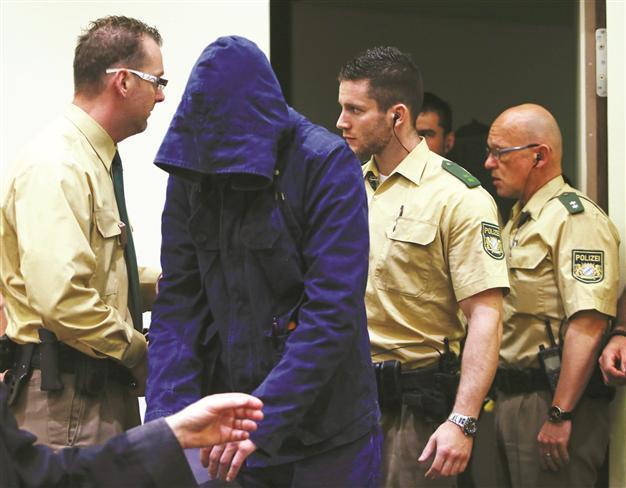Neo-Nazis burned döner kiosk ‘for fun’: Witness
MUNICH

A co-defendant hides his face under his hood as he arrives for the trial. AFP photo
One of the key witnesses in Germany’s neo-Nazi murder trial has described the motives behind fatal attacks on mainly Turkish shops during his teenage years some 15 years ago, noting the joy of attacking the property of Turks in the country.
“We turned it into fun, and taught them a lesson at the same time,” co-defendant Carsten Schultze told a Munich court on June 5.
Schultze said being a neo-Nazi made him feel strong and gave him a feeling of “belonging.” He described how he had kicked victims and smashed the windows of Turkish snack stalls.
When the judge asked him what his motive was for joining in racist attacks, he said: “All I know is that one of us had the idea and then we all went along. I don’t have exact memories. I assume of course that this döner stall represented a certain image of the enemy.”
Schultze is charged with being an accessory to murder. He allegedly helped the National Socialist Underground (NSU) by providing the murder weapon used in all 10 of the killings. The NSU is suspected of involvement in the killings of 10 people, eight of them Turks, between 2000 and 2007.
A trial against the cell’s survivor member, Beate Zschaepe, started last month. The two other members, Uwe Böhnhardt and Uwe Mundlos, committed suicide as the police closed in on them after a bank robbery in November 2011. A probe into the handling of the case revealed oversights and missteps by police and domestic intelligence services and a realization that the right-wing extremist threat had been grossly underestimated.
Schultze said he had been opposed to Germany being a multicultural society and was against financial capitalism. “It was a simple ideology, black and white. The fact that we were losing our homeland, that we’re governed by financial Jewry, and in a certain respect I believed in that.”
He said the decisive motivation for him was that he felt good being part of a neo-Nazi group. “I felt respected. I felt good. I felt strong. The feeling of belonging; I thought it was great.”
Schultze said he quit the neo-Nazi scene in 2000 and moved from Jena in eastern Germany to Düsseldorf to study social pedagogy. He has been cooperating with the police since his arrest in 2012. If found guilty, he could face a jail term of between three and 15 years.
